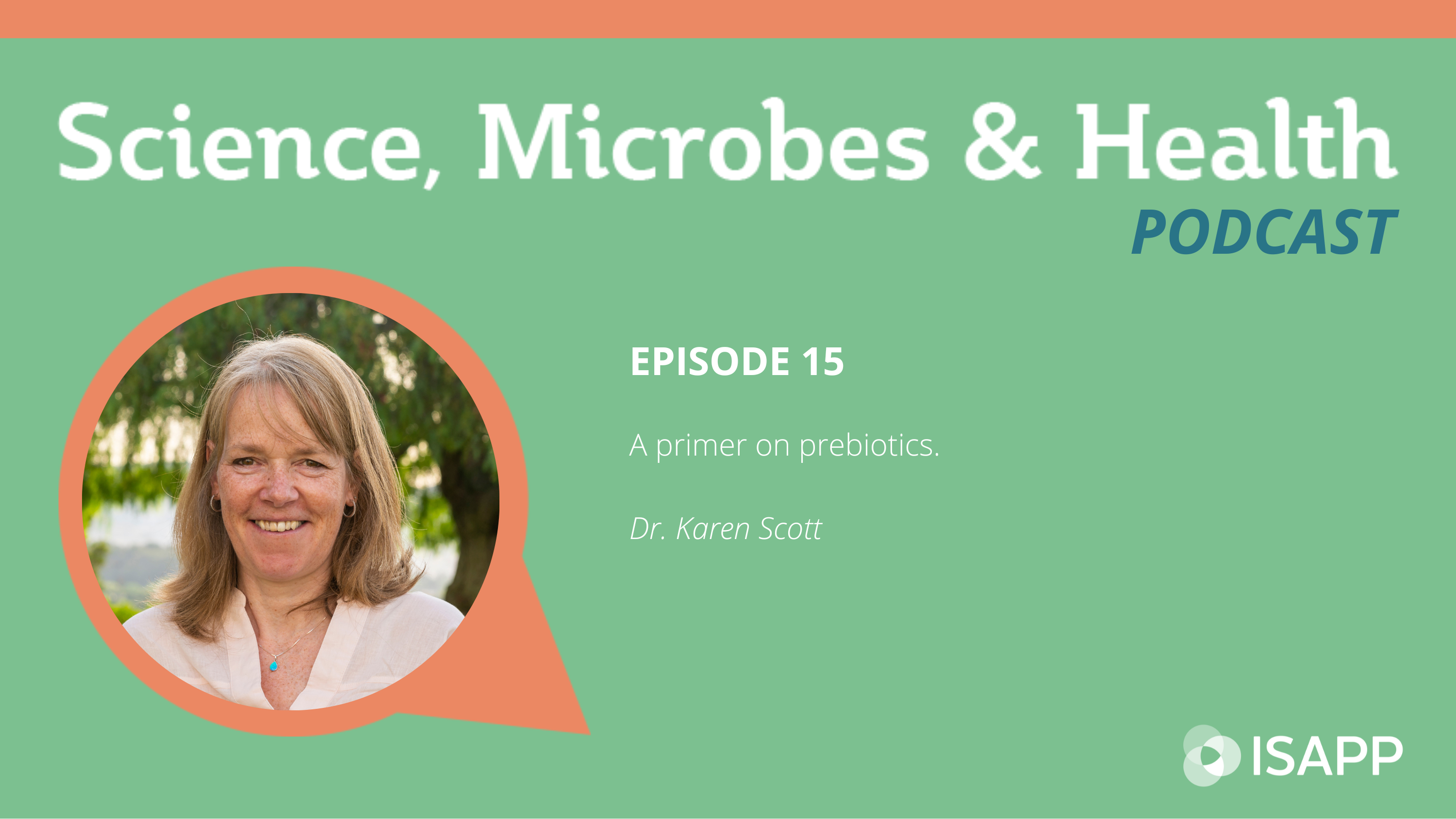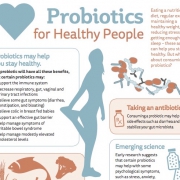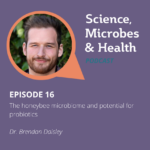Episode 15: A primer on prebiotics

Podcast: Play in new window | Download
Subscribe: Apple Podcasts | Spotify | RSS
The Science, Microbes & Health Podcast
This podcast covers emerging topics and challenges in the science of probiotics, prebiotics, synbiotics, postbiotics and fermented foods. This is the podcast of The International Scientific Association for Probiotics and Prebiotics (ISAPP), a nonprofit scientific organization dedicated to advancing the science of these fields.
A primer on prebiotics, with Dr. Karen Scott
Episode summary:
In this episode, the ISAPP podcast hosts talk about prebiotics with Karen Scott, PhD, who is an ISAPP board member and Senior Research Fellow at Rowett Institute, University of Aberdeen, Scotland. Scott describes what prebiotics are, as well as the latest thinking about how they fit within an overall healthy diet and how they confer health benefits through the gut microbiota.
Key topics from this episode:
- Dr. Scott and colleagues at the Rowett Institute began many years ago by working on anaerobic bacteria from the rumen of animals, then started to focus on the bacteria in the human large intestine.
- Prebiotics (see definition below) stimulate the growth of beneficial bacteria in the human gut, and in doing so, benefit host health.
Prebiotics alone cannot guarantee health: they must be consumed in addition to a healthy regular diet, which helps support thediversity of all gut microbes. - Prebiotics are not necessarily supplements; they are found in high amounts in many foods such as bulb-based vegetables, banana, and plantain. Around 5g of prebiotic per days is beneficial for health.
- Not all prebiotics are equal: they each stimulate the growth of particular groups of bacteria. By definition, they must be selectively utilized (that is, some bacteria but not others must use them), and this differentiates prebiotics from fiber.
- Some prebiotics are shown to improve gut transit (i.e. reduce constipation). One common example of the benefit of prebiotics has to do with bone health: metabolism of prebiotics in the colon tends to lower the pH; this increases calcium absorption for supporting bone health. Other benefits involve the production of short-chain fatty acids.
- Bifidobacterium have traditionally been a group of bacteria targeted by prebiotics. Some Bifidobacterium produce lactate, and other bacteria produce butyrate (important for colonic health) from lactate. In healthy adults, there are bacteria that are equally or more important than bifidobacteria, however.
- Prebiotics can target other body sites besides the gut.
- Prebiotics that can be used by a bacteria in pure culture are not necessarily used by those bacteria within the ecosystem of the human gut.
- New experimental platforms exist to see which bacteria are producing specific compounds on the growth of a specific substrate. But a model may not represent what is happening in the host, so this must be specifically tested.
- Human milk oligosaccharides are a great example of how prebiotics are important to human health. Formula is often supplemented with prebiotics because of ample evidence that oligosaccharides (naturally present in human milk, but mimicked synthetically) enable growth of specific bacteria in the baby’s gut that are very important for immunity and other aspects of health.
- Overall, to support bacteria in your gut and overall health, Dr. Scott recommends consuming a diverse diet: “eat a rainbow”. If you cannot, a prebiotic supplement is advisable.*
Episode abbreviations and links:
Dr. Karen Scott works at the Rowett Institute, a renowned centre focused on nutrition and human health.
ISAPP published the scientific consensus definition of prebiotics.
An early review co-authored by Dr. Scott, covering gut microbiota functions and their impact on host health via diet.
A review on prebiotics to support calcium absorption and therefore bone health.
Dr. Scott refers to a new tool: the Exploris 240 Orbitrap mass spectrometer, which is interfaced with an atmospheric pressure matrix assisted laser desorption ionisation (AP-MALDI) source and direct infusion. This theoretically allows scientists to measure the distribution and composition of complex gut bacterial communities, whilst simultaneously assessing metabolite production from the constituent microbes, allowing them to better understand the cooperation and competition between different human gut microbiota species.
Additional resources:
Prebiotics. ISAPP infographic.
Understanding prebiotics and fiber. ISAPP infographic.
The many functions of human milk oligosaccharides: A Q&A with Prof. Ardythe Morrow. ISAPP blog post.
About Dr. Karen Scott:
Dr. Karen Scott is a Senior Research Fellow at the Rowett Institute, University of Aberdeen. She leads a research team investigating the (molecular) mechanisms by which key members of the gut microbiota interact with the diet and host, at different life-stages. The fermentation products of gut bacteria contribute to gut health, and are differentially expressed on different substrates, including prebiotics. In vitro bacterial growth studies utilising our large culture collection of gut anaerobes (in pure culture, mixed culture, fermentor systems, and also with human cells) and bioinformatic analyses illustrate niche-specific processes and bacterial interactions. Resident bacteria are also an important reservoir of transferable antimicrobial resistance genes, and other work investigates the evolution and spread of resistance from farm to fork.














